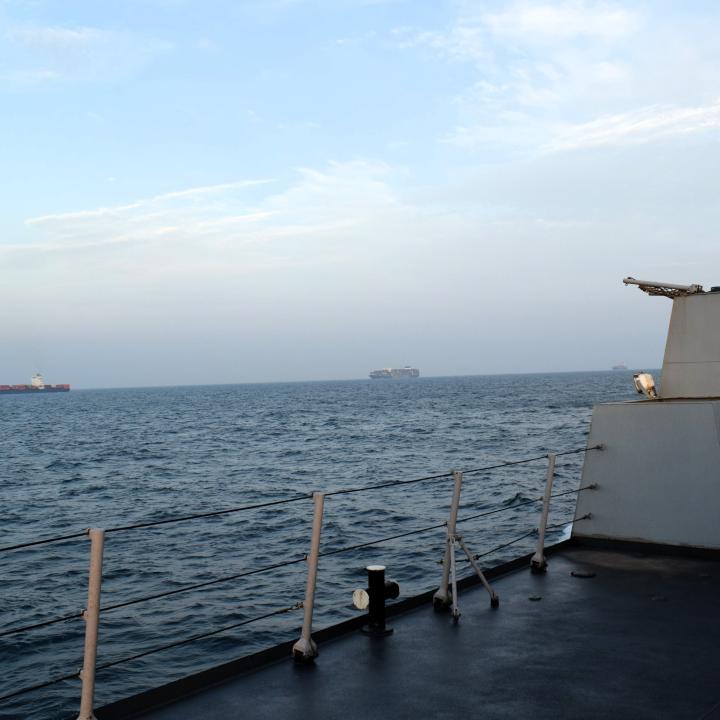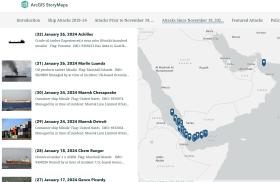
Even After Houthi Attacks, Russia-Linked Tankers Return to Red Sea

Part of a series: Maritime Spotlight
or see Part 1: Tracking Maritime Attacks in the Middle East Since 2019
The operators are either accepting risk on a vital transport route or else no longer concerned about perceptions about their vessels’ past links to Britain.
On July 11, according to shipping data from MarineTraffic, the crude oil tanker Andromeda Star (IMO 9402471) was situated at the southern entrance of the Suez Canal, having come from Russia’s Port of Ust-Luga and bound for Asia. What is peculiar here is that the vessel was attacked in late April with antiship ballistic missiles (ASBMs) launched by Yemen’s Houthis (see The Washington Institute’s maritime incident tracker). Yet despite the April attack, the Andromeda Star has continued sailing in the Red Sea to the Asian market, where India and China are Moscow’s key clients. At the time of the attack, the Houthis inaccurately labeled the ship “a British oil tanker,” most likely due to its past links to a UK-based company. In reality, however, the ship is an EU-sanctioned vessel whose registered owner is based in the Seychelles, part of a “dark fleet” transporting Russian oil amid Western sanctions on Moscow’s energy sector. Data from the Institute’s maritime incident tracker and from MarineTraffic shows that the Panama-flagged tanker is not the only vessel involved in transporting Russian oil that has kept crossing the Red Sea after experiencing a Houthi attack. Such cases can help clarify why some Russia-linked tankers continue on their route following a Houthi attack while other tankers’ owners or operators avoid the Gulf of Aden/southern Red Sea route and instead sail around southern Africa.
Several oil tankers involved in transporting Russian energy supplies have engaged in maritime practices that obfuscate their movements, such as manipulating automatic identification system (AIS) data. The movements of the selected Russia-linked oil tankers discussed below were confirmed by TankerTrackers.com and Lloyd’s List. Preliminary checks by Lloyd’s List revealed that the course and speed indicated by the vessels’ AIS signals comported with normal sailing conditions. TankerTrackers.com, a maritime intelligence company that specializes in tracking the global dark fleet of tankers, confirmed detecting both vessels in the Red Sea in July and August.
Andromeda Star
On April 26, the Houthis indicated in a statement that they “attacked a British oil tanker (Andromeda Star) in the Red Sea with a number of appropriate naval missiles, and the ship was directly hit.” This is one of several examples showing how the Houthis relied on outdated shipping data to select their targets over the past months. The Andromeda Star was owned by UK-based Union Maritime Ltd. from October 2019 until November 23, 2023, according to one shipping database. When the Houthis attacked the tanker on April 26, the vessel’s new beneficial owner was not disclosed, and the new registered owner was the Seychelles-based company, identified as Algae Marine Inc. Prior to the incident, the Andromeda Star was signaling “no contact with Israel” in its AIS, a measure several commercial ships have taken to avoid being attacked, although it is not always effective. The tanker was carrying Russian oil that was later offloaded in India, data from Kpler shows.
After leaving India, the Andromeda Star sailed back to Russia’s Port of Ust-Luga through the Red Sea following some regional port stops, arriving there on June 19 to pick up a new cargo, according to data from MarineTraffic.
Available data indicates that the Houthi attack on the Andromeda Star in April was based on the belief that the ship still had links to Britain. When a vessel repeatedly switches hands and names within a short period, this can cause confusion, especially since the new ownership information is not always reflected immediately in all databases. The Houthis may not have known of the change in ownership, or they may have known but decided to attack based on the vessel’s past UK links. The second possibility cannot be ruled out because the Houthis have attacked commercial ships based on past affiliations or port calls since they began their maritime campaign in November 2023. A similar pattern was observed with a commercial ship attacked in March in the Red Sea that was also transporting Russian oil.
Freda (Formerly Huang Pu)
On August 14, the Panama-flagged crude oil tanker Freda (IMO 9402469) was seen sailing north in the Red Sea toward the Suez Canal, signaling “all Chinese crew” via its AIS. The tanker was traveling from India’s Jamnagar refinery, but previously had been seen at Russia’s Far East Kozmino terminal, where Russian ESPO (Eastern Siberian–Pacific Ocean) blend crude oil is loaded, according to data from Kpler. As of August 21, the tanker was in the Mediterranean Sea, having come from the Suez Canal, and was signaling for the Russian Port of Primorsk.
On March 23, the Houthis fired five ASBMs toward the tanker—at that time called Huang Pu—labeling it a “British ship,” just as it did the Andromeda Star. This attack was also based on outdated ownership information. The tanker was linked to the UK-based Union Maritime Ltd. from October 2019 until January 2024, according to two shipping databases, including Equasis, but it was no longer owned by the company when the attack occurred. The shipping databases indicate that the current registered owner is Hong Kong–based Hera Gam Ltd., with its safety and technical management handled by a China-based company, although there is conflicting data about its name. U.S. Central Command referred to the ship attacked as a “Chinese-owned, Chinese-operated oil tanker.”
According to CENTCOM, “The Houthis attacked the MV Huang [now known as Freda] despite previously stating they would not attack Chinese vessels.” On March 21, a few days before the attack, a media report cited sources indicating that the Houthis told China and Russia that their vessels would not be targeted in the region. The Yemeni group has not targeted China- or Russia-flagged commercial vessels, and the attacks on tankers carrying Russian oil so far have been due mainly to outdated ownership information or trade with Israel by the ship’s owner/operator (see this Maritime Spotlight). For instance, three separate attacks took place this month in the southern Red Sea—against the Delta Blue (IMO 9601235), Delta Atlantica (IMO 9419101), and Sounion (IMO 9312145). All three are linked to a Greece-based company with at least one oil tanker seen off Haifa, Israel, on July 10, according to data from MarineTraffic and Kpler.
That Freda and Andromeda Star recently crossed the Red Sea despite the attacks earlier this year likely indicates one of two things: either the owners/operators are taking great risks in a vital oil transportation route, or they are confident that the issue of the ships’ past links to Britain has been resolved and that they can travel safely. If the issue has been resolved, this might have been achieved through a special communication link to the Houthis, although this will remain speculative until it is corroborated by further observation of activity by these and similar ships.
View the maritime attack tracker here.




